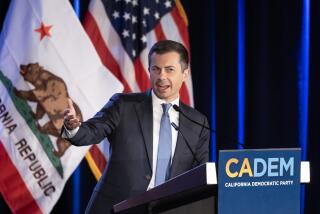Underdogs of GOP Right Talk Issues in Bay Area
- Share via
NEWARK, Calif. — Bob Smith will probably never be president of the United States. But that didn’t stop New Hampshire’s senior senator from flying 3,000 miles to spend 45 minutes Sunday explaining why he should be.
Gary Bauer scarcely registers a blip in presidential preference surveys. Still, he hustled from Louisiana to the Bay Area on Saturday and stayed up well past his East Coast bedtime to offer a banquet audience his vision of a Bauer administration.
Forget their lowly standing deep in the nether reaches of opinion polls. For longshot candidates Smith and Bauer, the competition for the GOP presidential nomination is just as heated as if they were going head-to-head against front-running Texas Gov. George W. Bush--which is precisely where they hope to be roughly a year from now.
Long before most people are even paying attention to the 2000 campaign, the crowded Republican race has plainly sorted itself into a divided contest.
There is the race between Bush, former Red Cross President Elizabeth Dole and Arizona Sen. John McCain, each courting big-name endorsements, big-money support and offering high-profile pronouncements to wide notice.
And then there is the lower-rung fight between several of the also-rans, including the most ideologically conservative candidates, who forage for attention--and often money too--in hopes of lasting long enough for a clear shot at the establishment favorite once he (or she) emerges from the early contests in Iowa and New Hampshire.
“There’s essentially two primaries,” observed Marshall Whitman, an analyst with Washington’s conservative Heritage Foundation. “There’s the primary for the regular party and the primary for the party of the right.”
It is unlikely any latter contestant will win the GOP nomination, let alone capture the White House. Nevertheless, the candidate sent forth by conservative cadres could have a significant impact on whoever does prevail in the primaries, in terms of the party’s image, the message Republicans carry into 2000 and the degree to which the GOP unites behind its eventual nominee.
Five of the six candidates competing most intensively for the crown of true-blue conservative traveled this weekend to Newark, a bedroom community of San Francisco and the Silicon Valley, to pay homage to activists of the California Republican Assembly, the state’s biggest and most important organization of GOP grass-roots activists. Only former Vice President Dan Quayle, stumping in Iowa, stayed away.
One after another, Bauer, Smith, Steve Forbes, Alan Keyes and Patrick J. Buchanan sounded common themes of lower taxes, higher morality, a more muscular defense, and most consistently, an uncompromising stance against abortion under all circumstances.
“We fought our hearts out in ’92 and ’96 and we kept the party pro-life,” said Buchanan, who emerged as the conservative insurgent in both those presidential campaigns. “We’re going to keep the party pro-life in the year 2000.”
The high school massacre in Littleton, Colo., was a focal point of the weekend, and it struck another chord of commonality among the candidates. They agreed, as Smith put it, “it’s not the weapons” that caused the tragedy. Rather, they blamed the negative influences of Hollywood and a godless and violent culture on the youthful gunmen. “This is the America the courts have given us and the elites have given us,” said Bauer, former head of a traditional-values lobbying group. He joined other candidates in rejecting gun control, or for that matter, any legislative response to the tragedy from the federal government.
“It’s up to us as individuals to really look at ourselves, our families and say, ‘Are we doing enough?’ ” Forbes said.
For all the consensus among the candidates, some slight differences emerged. Buchanan and Smith called for an immediate, unilateral suspension of U.S. involvement in the war in Kosovo. “This is Europe’s war,” Buchanan said. Forbes, however, called for stepped up NATO bombing, and Bauer warned against the message a U.S. pullout would send to China, North Korea and Iraq.
Most of the criticisms heard over the weekend were directed at the front-running Bush and to a lesser extent, Dole. The mere mention of their names drew scattered hisses from the about 300 activists attending the banquet Saturday night.
Bauer suggested Republicans “ought to be ashamed of themselves” for downplaying the abortion issue--a stance Bush and Dole have both advocated as they reach out to voters in the middle. Smith was even more pointed in his Sunday speech, condemning Bush and Dole for failing to speak out more forcefully against abortion. “What would have happened,” Smith asked, “if Lincoln said, ‘I’m opposed to slavery, but if my neighbors want to own slaves, that’s OK?’ ”
Officials of the organization noted that all the Republican presidential candidates were invited to attend the gathering, though not all could have anticipated a friendly welcome. Still, those who shun the organization--and its uncompromising conservatism--do so at their own political peril, said Steve Frank, a longtime GOP strategist now organizing Republican Assembly chapters in more than 40 states.
“The Bushes, the Doles, the McCains--they can’t win without a majority of the Republican Party behind them,” said Frank, as activists around him polished off their lemon sponge cake. “In 1998, the party mushed its message and our people stayed home. If that happens in 2000, who do they think will walk the precincts? Who do they think will man the telephones?”
More to Read
Get the L.A. Times Politics newsletter
Deeply reported insights into legislation, politics and policy from Sacramento, Washington and beyond. In your inbox twice per week.
You may occasionally receive promotional content from the Los Angeles Times.











